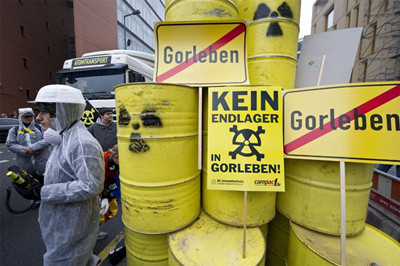But there are problems with each of these ideas.
但這些想法總是伴有各種各樣的問題。
For example, it would be difficult to monitor nuclear waste under the ocean floor.
例如海底的核廢料就很難監測。
Waste buried deep in the earth, meanwhile, might contaminate ground water.
而深埋于地底的垃圾同時可能會對地下水造成污染。

And as ice sheets continue to melt, it's hard to say how long nuclear waste would remain buried, or where it would end up if it floated away.
而隨著冰川持續融化,核廢料能夠掩埋多久很難說清,或者最終會飄走。
Plans to store waste produced in the United States in Yucca Mountain, in Utah, have been put on hold.
而美國猶他州尤卡山保存產生核廢料的計劃現在也已被擱置。
So for now almost all nuclear waste is kept above ground in special containers at a few hundred different sites around the country.
所以現在幾乎全部核廢料都被保存在全國幾百個不同地點的特殊容器中。
So far the containers seem safe, but there's always the possibility of corrosion.
到目前為止容器看起來非常安全,但總是存在被腐蝕的可能性。
So, basically, there is no best way to store nuclear waste.
所以,基本上保存核廢料沒有最佳之法。











